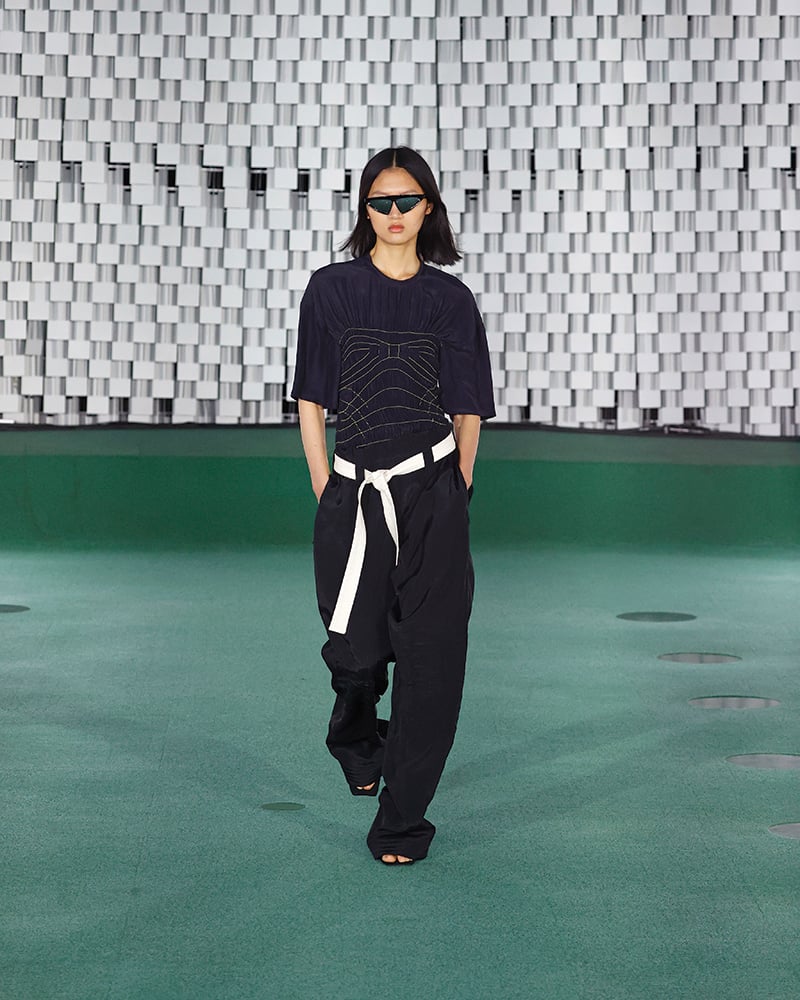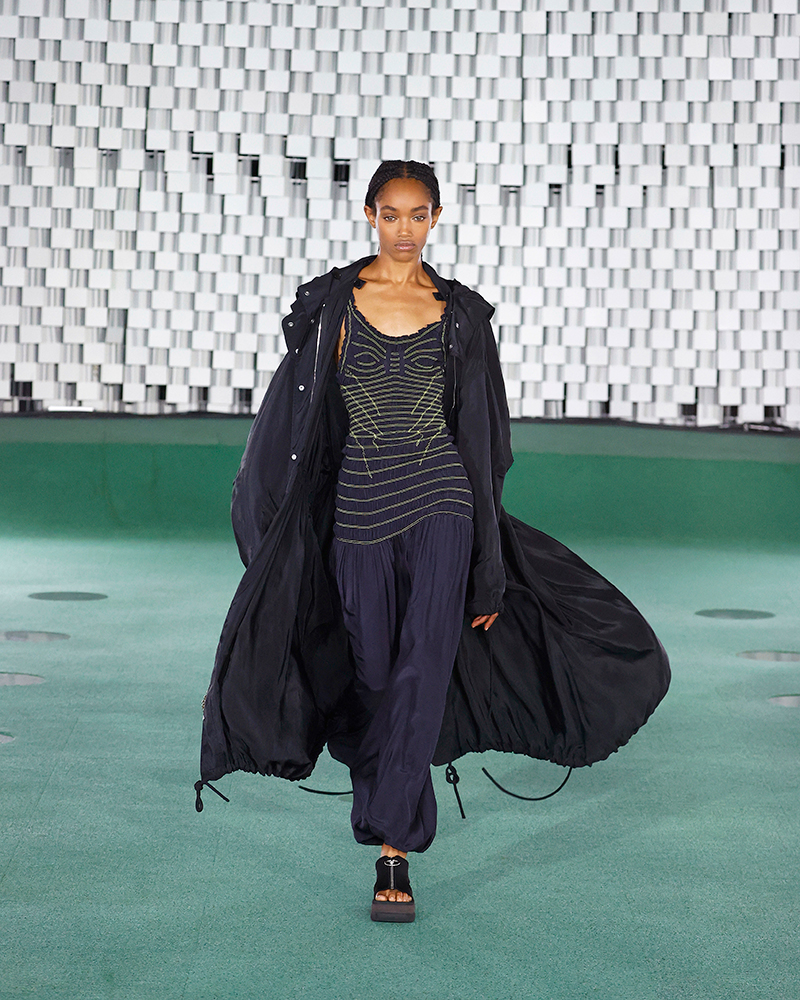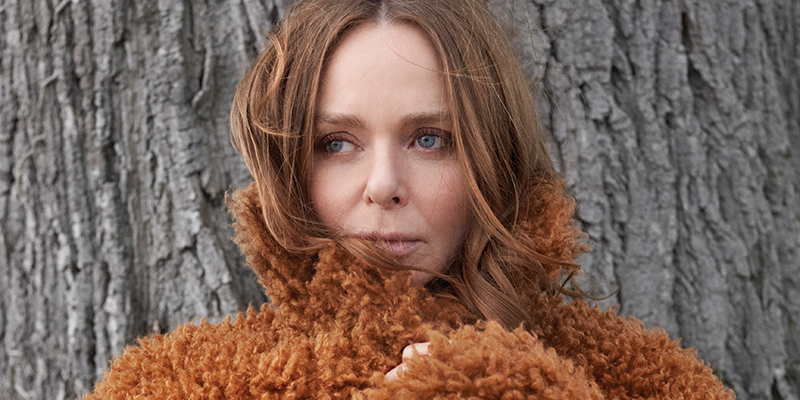March’s – ‘The Sustainability Issue’ – Download Now
Stella McCartney was once ridiculed by the fashion industry for being an “eco weirdo” for having a laser focus on all things sustainability. Yet, for over two decades now she has been a pioneer in promoting sustainable practices, something that much of the industry is only now implementing.
We speak exclusively to McCartney on spearheading sustainability, the things that must change in the fashion industry, what inspired her latest collection.
Last year marked 20 years of your eponymous brand. How have things evolved since you launched in 2001?
When I started on this journey, I was the one being ridiculed for being an ‘eco weirdo’, being told that I wouldn’t have a successful brand if I didn’t use leather or fur, but fast forward 20 years and we now have the black and white data to back up the fact that the fashion industry is one of the most polluting industries in the world. People are finally starting to understand that we are now in danger of ruining our planet if we don’t consider how we treat the land or how we farm, how we consume… and the conversation is finally here. To be truly modern, I believe that you must initiate and embrace change which is why I have been campaigning recently for legislation to be set for the fashion industry and incentives to be given out to brands who comply, because right now the industry is not regulated which is why brands are getting away with murder. Collectively, it’s crucial that we, as an industry, commit now to taking measurable action towards mitigating our impact for a more sustainable, ethical and mindful future.

You really spearheaded the sustainable fashion movement. As being one of the first to do so, while building your empire, how did you remain confident in your vision for your brand?
Working in this space can feel like an uphill struggle at times, especially in the early days when the conversation wasn’t there, you had to really dig deep to find suppliers that were happy to work in a new way because it just wasn’t on people’s agenda back then…. but I persevered because I had my beliefs and I had a vision, and I still work with that same mentality to this day. It’s important that I surround myself with an amazing team who all have the same vision and who work so hard to keep our brand at the forefront of being environmental leaders in fashion. I couldn’t do it without them!
Being invited to represent the fashion industry at COP26 and G7 with HRH The Prince of Wales was an incredible honour and was a real sort of reflection moment for me that made me realise that at last the fashion industry is finally being taken seriously and secondly that all the hard work I’ve put in over the past 20 plus years hasn’t been for nothing. We leveraged the global platform of COP26 to showcase the limitless possibilities of material innovation – using our current achievements to hopefully inspire future actions, from private investment to government incentives for nature- positive solutions. We created an exhibit that we titled the Future of Fashion which was designed to bring our amazing material innovations to life – literally! At the centre of the installation was a live fungi display, continuing the narrative from our Summer 2022 collection. Surrounding the fungi, and alongside hard-hitting facts about the current state of the industry, we had key pieces that exemplified our commitment to innovation, including the first-ever bags and garments made from Bolt Threads’ MyloTM mycelium leather (hence the live fungi display!) as well as vegan, plant-based and regenerated materials crafted from waste.
In terms of the fashion industry as a whole, what is it that needs to change?
I think you only need to look at the facts to realise that leather production within the fashion industry is one of the most urgent issues. We need to dispel the myth that leather is a by-product of the meat industry – it accounts for up to 20 per cent of the commercial value of a cow. Not only is it completely cruel, animal agriculture on a whole accounts for up to 18 per cent of global greenhouse gases vs. global transportation, which accounts for up to 13 per cent of global greenhouse gases. Leather can have up to 20 times the environmental impact as recycled synthetic alternatives… for example, since the introduction of our vegetarian Falabella handbag in 2009 we worked out we have saved the lives of 300,000 to 400,000 cows. That’s a colossal amount! Need I say more?
As an industry, we need to come together to support the companies that are working to create vegan alternative innovations, like we do at Stella McCartney with Bolt Threads who we have been working with for over 6 years now as well as the other innovation companies we work with. The more brands that invest and support these companies, the more accessible they will become, so this really is the only way we are going to start seeing these technologies become more widespread and in turn, see positive change.

However, there must be some things the industry is doing right. In your opinion, what are these?
Yes, slowly but surely we are moving in the right direction. For example, in the last few years, there has been a considerable increase in material developments and innovations that are becoming more readily available, and in turn becoming slightly cheaper to purchase because the demand is now there. These include recycled materials such as polyester, nylon, regenerated cashmere and more which we like to use throughout our collections as it reduces our impact. To show how far we’ve come, you can look at sequins as an example. I love working with sequins and back in the day, we just couldn’t use sequins because they are made with PVC which we don’t use as a brand due to the high impact it has on the environment; there were two colours to choose from but now we have a whole swatch book to choose from which shows that even with something so tiny like a sequin, someone is thinking about it which shows how far we have progressed. Working with new technologies and innovations is what drives me.
As a brand, we are putting a lot of focus on regenerative agriculture (or farming) because we believe this is the future of the fashion industry, and I can see there’s a growing interest in this space which is exciting. Regenerative farming is essentially a conservation and rehabilitation approach to farming, focusing on topsoil regeneration and aims to increase biodiversity and has been directly linked to helping reverse climate change. What’s interesting is that as fashion designers, we are very much farmers ourselves, we are working directly with the farmers because a huge majority of our fabrics are sourced from crops. This has really heightened for us here at Stella in recent years because we’ve been directly investing in a regenerative cotton farm in Turkey, with our partners Soktas, working with them on their regenerative cotton pilot programme. LVMH has also recently confirmed investment in the same farm, which gives me great hope because of the power that LVMH has over the industry.
What inspired your latest collection?
I am so proud of my latest collection – Summer 2022 which launches this month which is based around the transformative and transcendental qualities of mushrooms and mycelium. I watched the Fantastic Fungi documentary during the research phase and I was totally blown away by the power these little fungi can have, not only in nature and the many health benefits they provide, but the opportunities they present for the fashion industry when it comes to the developments in mycelium leather. As well as designing a gorgeous mushroom print that features on many of the looks, we were the first brand to put a mycelium handbag down the runway, which we plan to commercialise soon with our partners at Bolt Threads. I truly believe mycelium leather will replace traditional animal leather in the future. For the Summer show, I was lucky enough to have legend mycologist Paul Stamets narrate the opening of the show, and we worked with musical artist MycoLyco who specialises in creating music from the sound of mushrooms growing. This was just the beginning as we have a lot of exciting ideas for the launch of the campaign this month, so watch this space!
Who have been your key mentors throughout your career?
I’ve been lucky enough to have had some incredible mentors through my career, right from when I was starting out in college, through to my internships when I was testing out different areas of the fashion industry, to today where I am still learning and often seek advice from my peers within the industry. One piece of advice that has always stuck with me however comes from my very chic grandfather on my mother’s side who always told me that “staying power is the most important thing”. I have carried that all through my life. But you also have to be responsible in every way, that’s how you will stand out.
This is The Sustainability Issue – what does this mean to you?
The media have a great responsibility and platform to educate consumers and change the narrative so it always brings me joy when I see that magazines are dedicating whole issues to sustainability. My hope is that in a few years we won’t need dedicated issues because the whole issue will be championing responsible practice.
March’s – ‘The Sustainability Issue’ – Download Now
– For more on luxury lifestyle, news, fashion and beauty follow Emirates Woman on Facebook and Instagram
Images: Supplied












